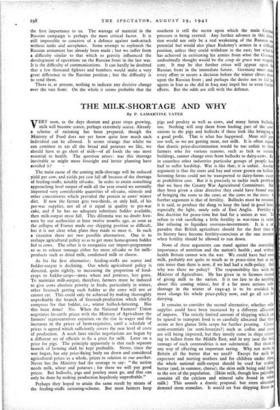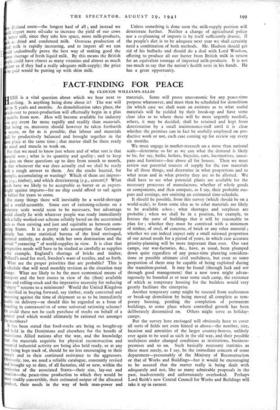THE MILK-SHORTAGE AND WHY
By P. LAMARTINE YATES
VERY soon, as the days shorten and grass stops growing, milk will become scarce, perhaps extremely scarce. Already a scheme of rationing has been prepared, though the Ministry of Food does not yet know quite how much each individual can be allowed. It seems strange that whilst we can continue to eat all the bread and potatoes we like, we should have to go short of milk—of all foods the one most essential to health. The question arises : was this shortage inevitable or might more foresight and better planning have avoided it? • The main cause of the coming milk-shortage will be reduced yield per cow, and yields per .cow fall off because of the shortage of feeding-stuffs, notably oil-cake. In order to attain something approaching level output of milk all the year round we normally imported very considerable quantities of oil-cake, oilseeds and other concentrates which provided the protein in cows' winter diet. If now the farmer gets two-thirds, or only half, of his pre-war supplies, not all of it equal in quality to pre-war cake, and if he has no adequate substitute fodder available, then milk-output must fall. This dilemtha was no doubt fore- seen by our authorities at least twelve months ago, as soon as the collapse of France made our shipping position so difficult, but it is not clear what plans they made to meet it. In such a situation there are two possible alternatives. One is to reshape agricultural policy so as to get more home-grown fodder fed to cows. The other is to reorganise our import-programme so as to release tonnage either for more oil-cake or for milk- products such as dried milk, condensed milk or cheese.
As for the first alternative: feeding-stuffs are scarce and fodder-output is declining. Our whole agricultural policy is directed, quite rightly, to increasing the proportion of food- crops to fodder-crops—more wheat and potatoes, less grass. To maintain milk-output, therefore, farmers must be induced to give cows absolute priority in feeds, particularly in winter, other livestock getting such fodder as the cows will not or cannot eat. This could only be achieved by making thoroughly unprofitable the branch of livestock-production which chiefly competes for that fodder, i.e., winter bullock-fattening. Has this been done? No. When the National Farmers' Union negotiates fat-cattle prices with the Ministry of Agriculture the farmers' representatives expatiate on the rise in wages and the increases in the prices of farm-requisites, until a schedule of prices is agreed which sufficiently covers the new level of costs of production. A week later similar negotiations are begun by a different set of officials to fix a price for milk. Later on a price for pigs. The principle apparently is that each separate branch of farming shall be kept profitable. Never, since the war began, has any price-fixing body sat down and considered agricultural prices as a whole, prices in relation to one another. Never has the Ministry had the courage to say: " the nation needs milk, wheat and potatoes ; for these we will pay good prices. But bullocks, pigs and poultry must go, and that. can only be done by making production hopelessly unprofitable."
Perhaps they hoped to attain the same result by means of the feeding-stuffs rationing-scheme. But most farmers keep pigs and poultry as well as cows, and many fatten bullocks, too. Nothing will stop them from feeding part of the cows' rations to the pigs and bullocks if these look like bringing in a good profit. That is what has happened. Meat still pays too well, so we are getting meat, not milk. It is often argued that drastic price-discrimination would be too unfair to those farmers who for various reasons, such as lack on suitable buildings, cannot change over from bullocks to dairy-cows. Bo: in countless other industries particular groups of people have had to suffer hardship. War is like that; it is unfair. Another argument is that the roots and hay and straw grown on bullock. fattening farms could not be transported to dairy-farms except at prohibitive cost. But it is precisely to tackle such problems that we have the County War Agricultural Committees. Had they been given a clear directive they could have found ways of bringing the roots to the cows or the cows to the roots. A further argument is that of fertility. Bullocks must be retained. it is said, to produce the dung to keep the land in good heart especially, the light, sandy soils of East Anglia. Fertility is fine doctrine for peace-time but bad for a nation at war. To refuse to risk sacrificing a little fertility in war-time is rather like refusing to liquidate overseas-investments. It is a sad paradox that British agriculture should for the first time in its history have become fertility-conscious at the one moment when fertility should be allowed to run down.
None of these arguments can stand against the overriding importance of nutrition and the nation's health ; and without health Britain cannot win the war. We could have had more milk, probably not quite as much as in peace-time but at any rate more than there is now, if we had had .a milk-policy. And why was there no policy? The responsibility lies with the Minister of Agriculture. He has given in to farmers instead of giving milk to the• nation. It is too late to do anything about this coming winter, but if a far more serious milk- shortage in the winter of 1942-43 is to be avoided, he must change his whole price-policy now, and go all cut for dairying.
It remains to consider the second alternative, whether milk- supplies -could have been increased by a different allocation of imports. The strictly limited amount of shipping which can be spared to transport food is so carefully allocated that there seems at first glance little scope for further pruning. Certain semi-essentials (or semi-luxuries?) such as coffee and cool are still being imported, but they mostly come in ships return. ing in ballast from the Middle East, and in any case the total tonnage of such commodities is not substantial. But there i5 one way of effecting an important saving. Why not make iD Britain all the butter that we need? Except for milk for expectant and nursing mothers and for children under thief., the whole national milk-output should be used for making butter (and, in summer, cheese), the skim milk being sold liquid to the rest of the population. .(Skim milk, though less palatable, con sins all the calcium and mineral salts found in whole milk.) This sounds a drastic proposal, but stern situatiool demand stern remedies. It would set free shipping from the w Zealand route—the longest haul of all ; and instead we d import more oil-cake to increase the yield of our cows better still, since they take less space, more milk-products, h as dried and condensed milk. Overseas production of d milk is rapidly increasing, and to import all we can uld undoubtedly prove the best way of making good the ter shortage of fresh liquid milk. By this means the British ple could have almost as many vitamins and almost as much ium as if they had a really adequate milk-supply; the price be paid would be putting up with skim milk. Unless something is done soon the milk-supply position will deteriorate further. Neither a change of agricultural policy nor a re-planning of imports is by itself sufficiently drastic. If the people's diet is to be adequate next year we shall certainly need a combination of both methods. Mr. Hudson should get rid of his bullocks and should do a deal with Lord Woolton, offering to produce all our butter from British milk in return for an equivalent tonnage of imported milk-products. It is not too much to say that the nation's health rests in his hands. He has a great opportunity.



































 Previous page
Previous page